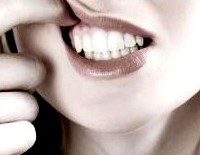 When gums recede, the amount of gum tissue surrounding the teeth wears away, or pulls back, leaving more of the tooth and tooth’s root exposed. Gaps also form between the teeth and the gum line, leaving room for bacteria to build up in these sensitive areas. This can result in damaged teeth or even tooth loss if left untreated.
When gums recede, the amount of gum tissue surrounding the teeth wears away, or pulls back, leaving more of the tooth and tooth’s root exposed. Gaps also form between the teeth and the gum line, leaving room for bacteria to build up in these sensitive areas. This can result in damaged teeth or even tooth loss if left untreated.
Gums can recede for a number of reasons. The most commons reasons for gum recession include:
- Periodontal Disease – Gum Disease is the main cause of gum recession.
- Harsh Tooth Brushing – Brushing your teeth too hard or the wrong way can cause gums to recede.
- Genes – Some people are more susceptible to gum disease and may be predisposed to gum recession.
- Poor Dental Care – Lack of brushing and flossing can allow for plaque to build up on teeth and aid in gum recession.
- Hormonal Changes – Changes in female hormones such as puberty, pregnancy and menopause can make gums more sensitive and lead to gum recession.
The best way to prevent gum recession is to take good care of your teeth and mouth by brushing flossing everyday and visiting your dentist twice a year for regular deep cleanings. Eating a balanced diet and avoiding smoking can also help prevent gum recession.
Have more questions about receding gums? Contact the professionals at DentaLux today, or leave a comment below!







Leave a Reply